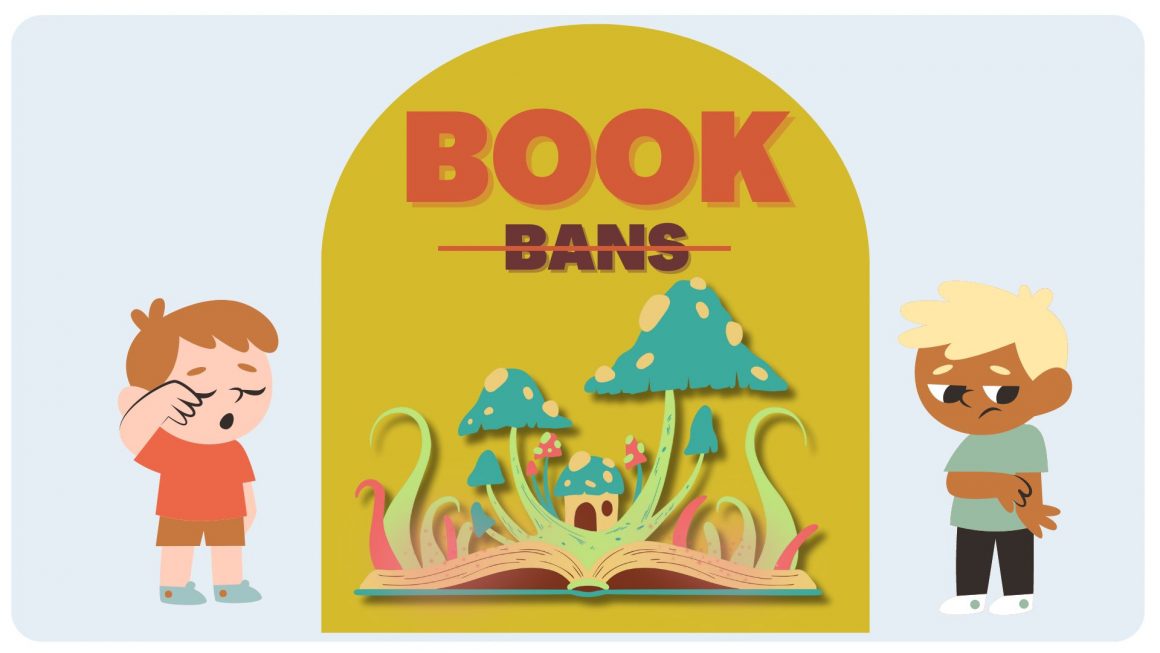
The rise of book bans: Should children be allowed to read books about trauma and PTSD?
By Grace Hagan, August 3 2024—
When evaluating the effectiveness of book bans, we must consider the cognitive differences between children with post-traumatic stress disorder (PTSD) and those without.
According to Emily Knox, an associate professor at the University of Illinois Urbana-Champaign, a book ban is censorship. Knox argues that the term ‘banned’ implies readers are denied the opportunity to form their own opinions on various topics. Knox emphasizes that many banned books deal with complex issues that often intersect with racial, gender and sexual politics.
Banning books does little to foster children’s ability to empathize with experiences different from their own. The impact of trauma on the reading brain creates a distinct learning disparity. Children with PTSD need books that accurately reflect their experiences while their non-traumatized counterparts often gravitate toward fantasies, fairy tales and ghost stories. How can we bridge this gap and ensure all children, regardless of their experiences, have access to meaningful literature?
The National Child Traumatic Stress Initiative highlights that about two-thirds of children in the U.S. under 16 report experiencing at least one traumatic event. A traumatized brain, frequently in survival mode, often struggles with cognition. Regardless of their experiences, all children need access to literature that encourages hope and altruism. Imagine a child who reads to develop affective empathy—the ability to share others’ feelings—rather than just cognitive empathy, which involves understanding how others think and feel. This shift can transform children’s literature into a powerful medium for young minds to gain profound insights about themselves, their society and the complex world they inhabit.
Nicholas Tucker, an advocate for childhood reading, argues that certain stories—like fantasies, fairy tales and ghost stories—might prevent children from becoming rational, capable adults. However, Kenneth Kid, a scholar specializing in children’s literature and psychoanalysis, contends that children’s literature is actually a promising forum for addressing trauma. In his work Trauma and Children’s Literature, Kid encourages exploring dark fiction, especially literature that delves into the exploitation of Jewish people during the Holocaust and other trauma-based texts that do not rely on “fairy godmothers or fortunate twists of fate.”
Book bans cut children off from supposedly exploitative or controversial content, often including pivotal work like To Kill a Mockingbird and The Diary of Anne Frank. These texts critique abusive power dynamics and propose ethical solutions to oppressive conditions such as exploring white supremacy through the lens of a child, offering potential for social and emotional change.
Sara Hodge and Michael Myers, researchers from Lesley University, question whether helping others during challenging times stems from altruism or self-interest. This same binary can apply to the debate on book bans. Are these restrictions, which in the U.S. would impinge upon the First Amendment, depriving children of texts that help them cultivate empathy in real-life scenarios?
Excluding books with whimsical or magical elements in favour of trauma-based texts does not guarantee that children will develop affective empathy. Nonetheless, creating an environment that encourages aiding strangers and marginalized individuals can help children recognize social patterns through mirror neurons. These neurons are activated by observing and experiencing emotions, leading to both self-focused and other-focused thoughts.
Ultimately, the cognitive differences between a child with PTSD and those without pose emotional and intellectual challenges. Book bans undermine the potential to use trauma-based books to foster healthier, sustainable attitudes during difficult times and to extend empathy to all children. They limit the necessary discourse on trauma, depriving children of stories or rhetoric that reflect the complexities of reality, which means taking a risk with more mature content.
This article is a part of our Opinions section and does not necessarily reflect the views of the Gauntlet editorial board.
